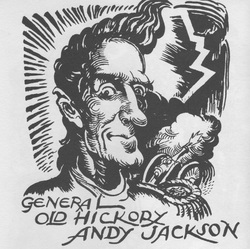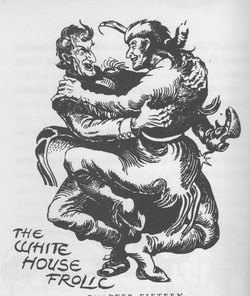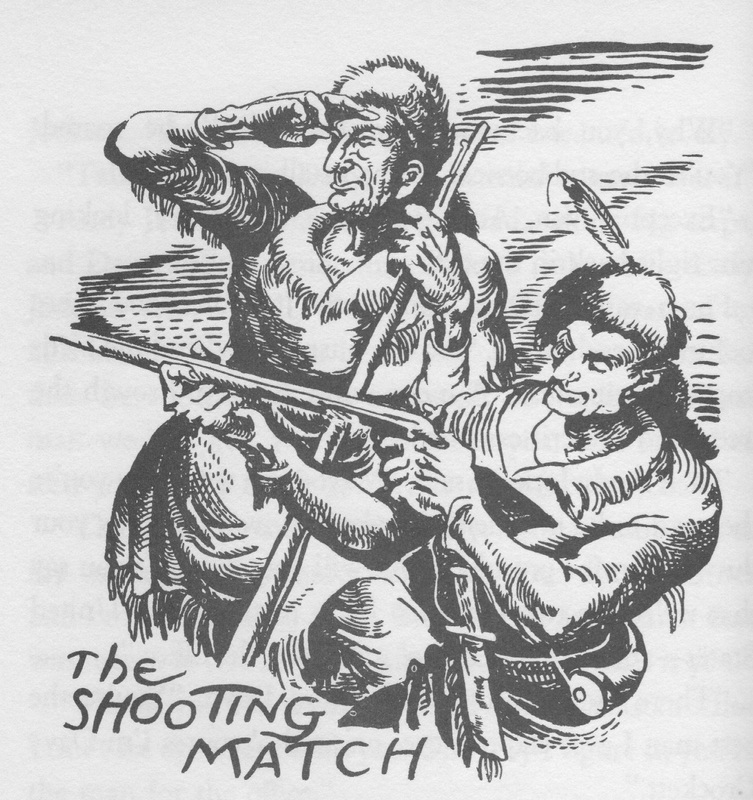
When people ask me how I came to write a book about Davy Crockett, I tell them it's because my elder daughter fell in love with Davy when when she was 4 years old. This explanation is perfectly true, but it leaves out one complicating fact – which is that Lizzie fell in love with Andy Jackson at the same time. For what seemed like a full year, she greeted visiting friends and relatives with the charmingly out-of-nowhere question: “Do you know who my favorite president is?”
Not many people answered correctly.
And really, how could anyone have guessed? Old Hickory was not a lovable man, though by most definitions he was a great one. The real David Crockett loathed his fellow Tennessean, whom he saw as an autocratic threat to democracy. And if you're looking to eliminate Jackson from your short list of cuddly presidents, all you have to do is think “Indian Removal” and “Trail of Tears.”
Ah, but it was the historical Andrew Jackson who forced the Cherokees to make that brutal, deadly trek west. The man Lizzie loved was someone else entirely.
As portrayed in Crockett legend – especially in a 1944 book for young readers by Irwin Shapiro, with wonderful illustrations by James Daugherty – Jackson was a mythic creature who was pals with the mythic Davy we had come to know. The starting point for Yankee Thunder: The Legendary Life of Davy Crockett was the “collection of tales, anecdotes, and plain and fancy whoppers” that appeared in Crockett almanacs for decades after Davy's death. But as Shapiro notes in his introduction, he improved on the almanac stories in a number of ways. He eliminated “coarse, even brutal” parts that were “not consonant with the large outlines of Davy's character”; arranged the stories in a coherent narrative; and inserted “General Old Hickory Andy Jackson” as a major character.
Not many people answered correctly.
And really, how could anyone have guessed? Old Hickory was not a lovable man, though by most definitions he was a great one. The real David Crockett loathed his fellow Tennessean, whom he saw as an autocratic threat to democracy. And if you're looking to eliminate Jackson from your short list of cuddly presidents, all you have to do is think “Indian Removal” and “Trail of Tears.”
Ah, but it was the historical Andrew Jackson who forced the Cherokees to make that brutal, deadly trek west. The man Lizzie loved was someone else entirely.
As portrayed in Crockett legend – especially in a 1944 book for young readers by Irwin Shapiro, with wonderful illustrations by James Daugherty – Jackson was a mythic creature who was pals with the mythic Davy we had come to know. The starting point for Yankee Thunder: The Legendary Life of Davy Crockett was the “collection of tales, anecdotes, and plain and fancy whoppers” that appeared in Crockett almanacs for decades after Davy's death. But as Shapiro notes in his introduction, he improved on the almanac stories in a number of ways. He eliminated “coarse, even brutal” parts that were “not consonant with the large outlines of Davy's character”; arranged the stories in a coherent narrative; and inserted “General Old Hickory Andy Jackson” as a major character.
Andy and Davy meet up during the Indian wars, and pretty soon they're arguing about which one should be president. “We're the best two men for it in these here United States,” Andy says, “and it's up to one o' us to take the office.” He wants Davy to run. Davy thinks Andy should do it. A shooting match with a surprise ending eventually settles the issue, and the next time the friends see each other, they're in Washington City, celebrating Andy's inauguration:
Andy Jackson cut loose with a regular wildcat screech. Davy came back with a horse neigh, and they circled round each other, flapping their arms and crowing like roosters. Then they both busted out laughing and thumped each other on the back.
“Why, you ol' slangwhanger!” said Andy Jackson.
Andy Jackson cut loose with a regular wildcat screech. Davy came back with a horse neigh, and they circled round each other, flapping their arms and crowing like roosters. Then they both busted out laughing and thumped each other on the back.
“Why, you ol' slangwhanger!” said Andy Jackson.

“You ol' bushwhacker, you!” said Davy.
“You backwoods galumpus!” …
“You screechin' wildcat!” ...
“You ring-tailed roarer!” …
“You red-headed alligator!”
No further differences between them are mentioned, and pretty soon they're teaming up to defeat an embodiment of anti-democratic evil named Slickerty Sam.
With Andy clearly established as Lizzie's favorite president, her sister needed one of her own. Exhibiting excellent historical judgment, Mona picked out a tall fellow named Abe. At some point, the girls' mother and I began to make up stories about two sisters who could step into a magic cardboard box and be transported to various points in the past. There, they would have fantastic adventures – or at least as fantastic as two chronically exhausted parents could make them – with their good friends Davy, Andy and Abe.
Cute, you may say, but why am I bringing this up?
The answer is that, after spending three years on a book about Crockett, I've got a better idea of what my family was doing with Andy, Davy and Abe. It's the same thing people have done with Crockett's story for almost two centuries now, and it's a human instinct more powerful than any pure quest for historical facts:
We were turning real lives into myths that met our immediate needs.
“You backwoods galumpus!” …
“You screechin' wildcat!” ...
“You ring-tailed roarer!” …
“You red-headed alligator!”
No further differences between them are mentioned, and pretty soon they're teaming up to defeat an embodiment of anti-democratic evil named Slickerty Sam.
With Andy clearly established as Lizzie's favorite president, her sister needed one of her own. Exhibiting excellent historical judgment, Mona picked out a tall fellow named Abe. At some point, the girls' mother and I began to make up stories about two sisters who could step into a magic cardboard box and be transported to various points in the past. There, they would have fantastic adventures – or at least as fantastic as two chronically exhausted parents could make them – with their good friends Davy, Andy and Abe.
Cute, you may say, but why am I bringing this up?
The answer is that, after spending three years on a book about Crockett, I've got a better idea of what my family was doing with Andy, Davy and Abe. It's the same thing people have done with Crockett's story for almost two centuries now, and it's a human instinct more powerful than any pure quest for historical facts:
We were turning real lives into myths that met our immediate needs.

 RSS Feed
RSS Feed